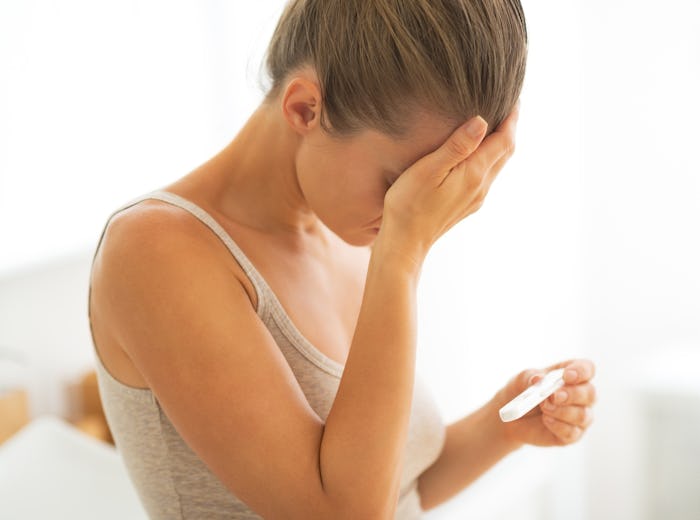Life

Here's The Deal With Anxiety & TTC
I don't know how many people told me when I was trying to conceive to "just relax and it will happen." However, I am crap at relaxing. I have an anxiety disorder. I'm good at freaking out — the best. But were they right? Can anxiety keep you from getting pregnant?
It's a loaded question, right? Anxiety seems to be the natural state of women who are trying to conceive. You're worried about getting pregnant, staying pregnant, eating the right things, exercising, someone stealing your baby names before you get to use them — everything. So when someone tells you that you should stop worrying if you want to get pregnant, it feels a bit like a blow.
First, it helps to map out how anxiety works, and theoretically, how that could negatively impact fertility. According to the Dialogues in Clinical Neurosciences, "anxiety is a psychological, physiological, and behavioral state induced in animals and humans by a threat to well-being or survival, either actual or potential." The article noted that it is a state of hyper-arousal that often prohibits the sufferer from coping successfully in a state of stress or in the face of a trigger. This can mean anything from tachycardia (rapid heart rate) to prolonged expressions of anxiety, like a more-pronounced increase of neuroendocrine response.
How would this physiological expression of psychological stress negatively affect fertility? Harvard's Women's Health Watch noted that "there's growing evidence of mutual influence between emotions and physical functioning," and that it's often overlooked or attributed to other concerns. The article noted that it's been linked to everything from heart disease to gastrointestinal disorders. (Having your stomach tied in knots by worry is a real thing.) But, can anxiety affect getting pregnant?
A recent peer-reviewed study in Nature Reviews: Urology found that it does affect male fertility. (Plot twist.) The research suggested that "stress is associated with reduced paternity and abnormal semen parameters." In layman's terms, their research concluded that the hormonal components of anxiety in males negatively affects the hormones that produce semen, making the male experiencing the anxiety less fertile.
What does that mean for women? Unfortunately, the science surrounding anxiety and fertility in women isn't as conclusive, and most of the studies available revolve around the anxiety women experience dealing with infertility and how to treat it. A lot of this scholarship is more quantitative than qualitative in nature, making me wonder why there's such a gender divide in this area. The United States Department of Health and Human Services website simply noted that science just isn't sure if anxiety can affect getting pregnant or not, but they still list ways to ameliorate the effects of anxiety.
Thankfully, there is some evidence that if there is a link between anxiety and getting pregnant, that mindfulness and meditation may help, according to a study done by Behaviour Research and Therapy. The study, conducted in China, showed higher pregnancy rates in women who practiced mindful meditation and self-care techniques unusual for them in their everyday lives.
For myself, my anxiety is such that just thinking about needing to relax or take care of myself better can trigger a wave of particularly crippling anxiety. When I was going through the processes of IUI, IVF, and rounds of fertility medication, my anxiety was through the roof, and the drugs I take to help bring myself back out of my own disorganized mind were off limits. The only thing I could do was whatever it was that day that helped — if anything. Sometimes I ran, sometimes I read, sometimes I cooked and poured a big glass of red wine before taking a long shower. I have no idea if the anxiety I experienced affected my fertility, but it did affect my overall well-being, and that's enough evidence for me to do whatever I could to mitigate its effects — all parents should feel the same.
If you're worried about your anxiety, your anxiety medication, or your overall wellbeing while trying to get pregnant, be sure to reach out to your healthcare provider. Your mental health is just as important as possibly becoming pregnant — you can have healthy versions of both.